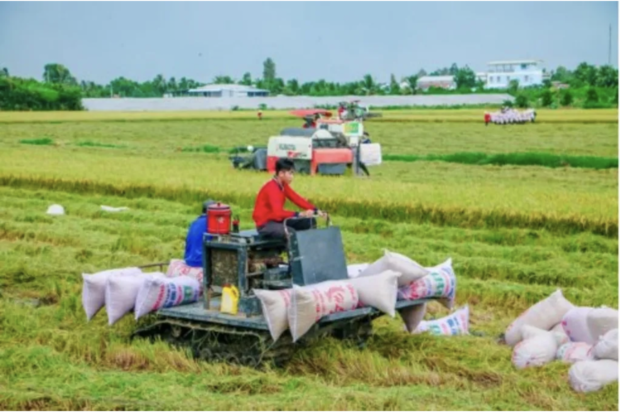Low-carbon rice production helps Vietnam meet emission target

Farmers harvesting rice the Mekong Delta City of Cần Thơ. Viet Nam News/Asia News Network
CẦN THƠ — Moving to low-carbon rice production offers the highest potential for Vietnam to meet its goal of cutting methane emissions by 30 percent by 2030 while boosting the competitiveness of a strategic export item, a new World Bank report says.
The report, titled “Spearheading Việt Nam’s Green Agricultural Transformation: Moving to Low-Carbon Rice,” suggests that Vietnam can transform the rice sector by cutting greenhouse gas (GHG) emissions, improving resource efficiency and yields, boosting resilience, and diversifying production.
Such transformation will require significant investment and major policy reforms to align incentives and coordinate behaviors of stakeholders at all levels.
“The agricultural sector, despite all its successes, is an important contributor to GHG emissions in Vietnam,” said Carolyn Turk, World Bank Country Director for Việt Nam, during the launch of the report in the “Integrated Climate Resilience and Sustainable Development of the Mekong Delta” workshop, co-organized by the Ministry of Agriculture and Rural Development and the World Bank in the Mekong Delta City of Cần Thơ on Saturday.
“It has reached a point where a transition to lower-carbon modes of farming is imperative – the longer it takes to switch, the higher the costs will be. Experience suggests that government has a catalytic role to play in driving the green transition through strategic allocation of public investment and strengthening the enabling environment for private sector participation in a modern, green agriculture sector,” she noted.
Rice, which is Vietnam’s most important crop and grown on more than half of its agricultural land area, accounts for 48 percent of the agriculture sector’s GHG emissions and over 75 percent of methane emissions.
Based on conservative estimates, improving water management and optimising application of inputs such as seeds, fertilizers, and pesticide can help farmers maintain or increase yields by 5 to 10 percent and reduce input costs by 20 to 30 percent, thereby boosting net profits by around 25 percent.
More importantly, these improved techniques would also help cut GHG emissions by up to 30 percent.
Such approaches were successfully piloted in over 184,000 ha of rice farming under the “Việt Nam Sustainable Agriculture Transformation” Project financed by the World Bank.
“These methods have been proven effective,” said Benoît Bosquet, World Bank Regional Director for Sustainable Development in East Asia Pacific. “If we can scale them up in the whole agricultural sector, they will help Vietnam progress towards its 2050 net-zero greenhouse gas emissions target.”
The report highlights five short- to medium-term policy areas to accelerate the transition to low-carbon agriculture, including ensuring policy coherence and plan-budget alignment, repurposing policy tools and public expenditures, promoting public investments, strengthening institutions, and enabling the private sector and other stakeholders to participate.
Minister of Agriculture and Rural Development Lê Minh Hoan said localities in the region must be active in implementing integrated Mekong planning, especially in the field of agriculture.
The most important thing is to “get rid of the output-first mindset”, and move towards a profitable approach through sustainable livelihood models for rice farmers, helping people increase their income per unit area.
“In the face of climate change, changing market trends and agricultural development directions, it is necessary to have well-oiled coordination between local authorities, scientists, businesses and farmers,” the minister stressed.
RELATED STORIES
Toward climate resiliency for the agri sector
Oxford Economics: Climate change makes food costlier in PH, Asean